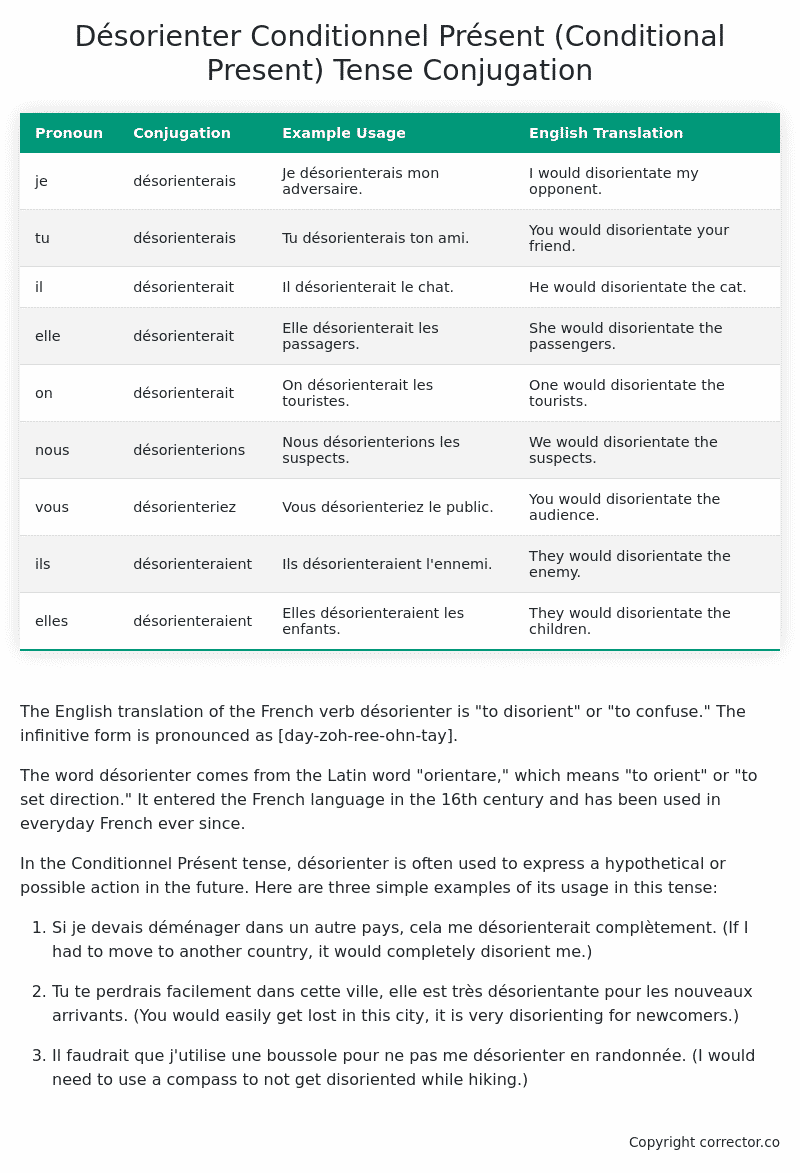Conditionnel Présent (Conditional Present) Tense Conjugation of the French Verb désorienter
Introduction to the verb désorienter
The English translation of the French verb désorienter is “to disorient” or “to confuse.” The infinitive form is pronounced as [day-zoh-ree-ohn-tay].
The word désorienter comes from the Latin word “orientare,” which means “to orient” or “to set direction.” It entered the French language in the 16th century and has been used in everyday French ever since.
In the Conditionnel Présent tense, désorienter is often used to express a hypothetical or possible action in the future. Here are three simple examples of its usage in this tense:
-
Si je devais déménager dans un autre pays, cela me désorienterait complètement. (If I had to move to another country, it would completely disorient me.)
-
Tu te perdrais facilement dans cette ville, elle est très désorientante pour les nouveaux arrivants. (You would easily get lost in this city, it is very disorienting for newcomers.)
-
Il faudrait que j’utilise une boussole pour ne pas me désorienter en randonnée. (I would need to use a compass to not get disoriented while hiking.)
Table of the Conditionnel Présent (Conditional Present) Tense Conjugation of désorienter
| Pronoun | Conjugation | Example Usage | English Translation |
|---|---|---|---|
| je | désorienterais | Je désorienterais mon adversaire. | I would disorientate my opponent. |
| tu | désorienterais | Tu désorienterais ton ami. | You would disorientate your friend. |
| il | désorienterait | Il désorienterait le chat. | He would disorientate the cat. |
| elle | désorienterait | Elle désorienterait les passagers. | She would disorientate the passengers. |
| on | désorienterait | On désorienterait les touristes. | One would disorientate the tourists. |
| nous | désorienterions | Nous désorienterions les suspects. | We would disorientate the suspects. |
| vous | désorienteriez | Vous désorienteriez le public. | You would disorientate the audience. |
| ils | désorienteraient | Ils désorienteraient l’ennemi. | They would disorientate the enemy. |
| elles | désorienteraient | Elles désorienteraient les enfants. | They would disorientate the children. |
Other Conjugations for Désorienter.
Le Present (Present Tense) Conjugation of the French Verb désorienter
Imparfait (Imperfect) Tense Conjugation of the French Verb désorienter
Passé Simple (Simple Past) Tense Conjugation of the French Verb désorienter
Passé Composé (Present Perfect) Tense Conjugation of the French Verb désorienter
Futur Simple (Simple Future) Tense Conjugation of the French Verb désorienter
Futur Proche (Near Future) Tense Conjugation of the French Verb désorienter
Plus-que-parfait (Pluperfect) Tense Conjugation of the French Verb désorienter
Passé Antérieur (Past Anterior) Tense Conjugation of the French Verb désorienter
Futur Antérieur (Future Anterior) Tense Conjugation of the French Verb désorienter
Subjonctif Présent (Subjunctive Present) Tense Conjugation of the French Verb désorienter
Subjonctif Passé (Subjunctive Past) Tense Conjugation of the French Verb désorienter
Subjonctif Imparfait (Subjunctive Imperfect) Tense Conjugation of the French Verb désorienter
Conditionnel Présent (Conditional Present) Tense Conjugation of the French Verb désorienter (this article)
Conditionnel Passé (Conditional Past) Tense Conjugation of the French Verb désorienter
L’impératif Présent (Imperative Present) Tense Conjugation of the French Verb désorienter
L’infinitif Présent (Infinitive Present) Tense Conjugation of the French Verb désorienter
Struggling with French verbs or the language in general? Why not use our free French Grammar Checker – no registration required!
Get a FREE Download Study Sheet of this Conjugation 🔥
Simply right click the image below, click “save image” and get your free reference for the désorienter Conditionnel Présent tense conjugation!

Désorienter – About the French Conditionnel Présent (Conditional Present) Tense
Formation
Common Everyday Usage Patterns
Expressing Polite Requests
Expressing Hypothetical Situations
Expressing Doubt or Uncertainty
Interactions with Other Tenses
Present Tense
Past Tense
Future Tense
Conditional Perfect
Summary
Want More?
I hope you enjoyed this article on the verb désorienter. Still in a learning mood? Check out another TOTALLY random French verb conjugation!


